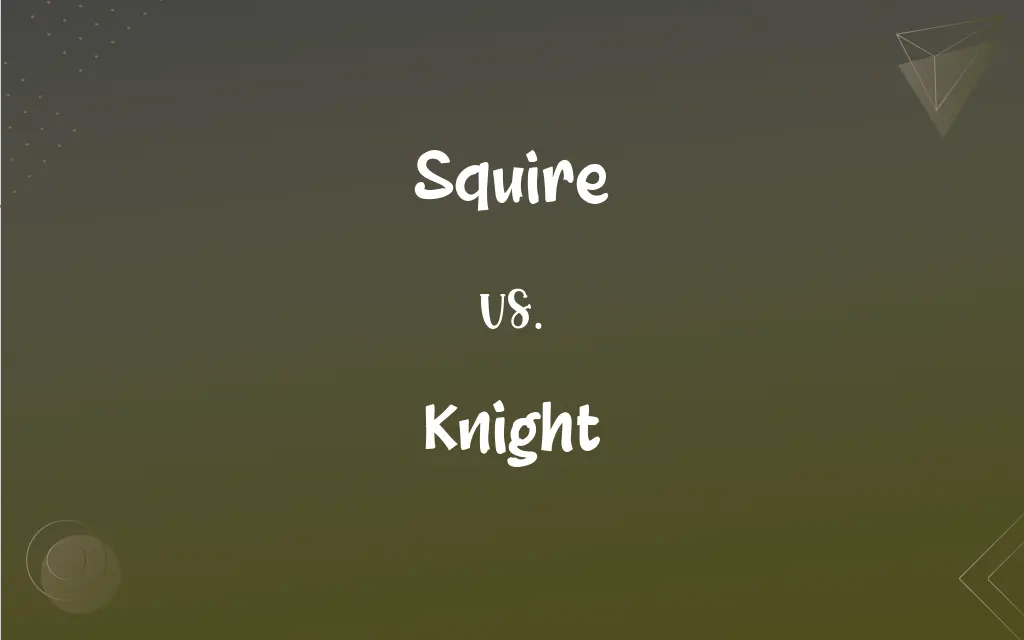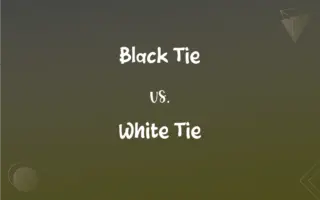Squire vs. Knight: What's the Difference?

Squire and Knight Definitions
Squire
A man who attends or escorts a woman; a gallant.
Knight
A medieval tenant giving military service as a mounted man-at-arms to a feudal landholder.
Squire
An English country gentleman, especially the chief landowner in a district.
Knight
A medieval gentleman-soldier, usually high-born, raised by a sovereign to privileged military status after training as a page and squire.
Squire
A magistrate or justice of the peace.
ADVERTISEMENT
Knight
A man holding a nonhereditary title conferred by a sovereign in recognition of personal merit or service to the country.
Squire
A local dignitary.
Knight
A man belonging to an order or brotherhood.
Squire
A young nobleman attendant upon a knight and ranked next below a knight in feudal hierarchy.
Knight
A defender, champion, or zealous upholder of a cause or principle.
ADVERTISEMENT
Squire
To attend as a squire; escort.
Knight
The devoted champion of a lady.
Squire
A shield-bearer or armor-bearer who attended a knight.
Knight
Abbr. Kt or N(Games) A chess piece, usually in the shape of a horse's head, that can be moved two squares along a rank and one along a file or two squares along a file and one along a rank. The knight is the only piece that can jump other pieces to land on an open square.
Squire
A title of dignity next in degree below knight, and above gentleman. See esquire.
Knight
To raise (a person) to knighthood.
Squire
A male attendant on a great personage.
Knight
(historical) A young servant or follower; a trained military attendant in service of a lord.
Squire
A devoted attendant or follower of a lady; a beau.
Knight
(historical) A minor nobleman with an honourable military rank who had served as a page and squire.
Squire
A title of office and courtesy. See under esquire.
Knight
(by extension) An armored and mounted warrior of the Middle Ages.
King Arthur and the Knights of the Round Table
Squire
Term of address to a male equal.
Knight
A person obliged to provide knight service in exchange for maintenance of an estate held in knight's fee.
Squire
(obsolete) A ruler; a carpenter's square; a measure.
Knight
(modern) A person on whom a knighthood has been conferred by a monarch.
Squire
(transitive) To attend as a squire.
Knight
(literary) A brave, chivalrous and honorable man devoted to a noble cause or love interest.
Squire
(transitive) To attend as a beau, or gallant, for aid and protection.
Knight
(chess) A chess piece, often in the shape of a horse's head, that is moved two squares in one direction and one at right angles to that direction in a single move, leaping over any intervening pieces.
Squire
A square; a measure; a rule.
Knight
A playing card bearing the figure of a knight; the knave or jack.
Squire
A shield-bearer or armor-bearer who attended a knight.
Knight
(entomology) Any of various nymphalid butterflies of the genus Ypthima.
Squire
A title of dignity next in degree below knight, and above gentleman. See Esquire.
Knight
(modern) Any mushroom belonging to genus Tricholoma.
Squire
A male attendant on a great personage; also (Colloq.), a devoted attendant or follower of a lady; a beau.
Knight
(transitive) To confer knighthood upon.
The king knighted the young squire.
Squire
A title of office and courtesy. See under Esquire.
Knight
To promote (a pawn) to a knight.
Squire
To attend as a squire.
Knight
A young servant or follower; a military attendant.
Squire
To attend as a beau, or gallant, for aid and protection; as, to squire a lady.
Knight
In feudal times, a man-at-arms serving on horseback and admitted to a certain military rank with special ceremonies, including an oath to protect the distressed, maintain the right, and live a stainless life.
Knights, by their oaths, should right poor ladies' harms.
Squire
Young nobleman attendant on a knight
Knight
A piece used in the game of chess, usually bearing a horse's head.
Squire
An English country landowner
Knight
A playing card bearing the figure of a knight; the knave or jack.
Squire
A man who attends or escorts a woman
Knight
To dub or create (one) a knight; - done in England by the sovereign only, who taps the kneeling candidate with a sword, saying: Rise, Sir --.
A soldier, by the honor-giving handOf CŒur-de-Lion knighted in the field.
Squire
Attend upon as a squire; serve as a squire
Knight
Originally a person of noble birth trained to arms and chivalry; today in Great Britain a person honored by the sovereign for personal merit
Knight
A chessman in the shape of a horse's head; can move two squares horizontally and one vertically (or vice versa)
Knight
Raise (someone) to knighthood;
The Beatles were knighted






































































